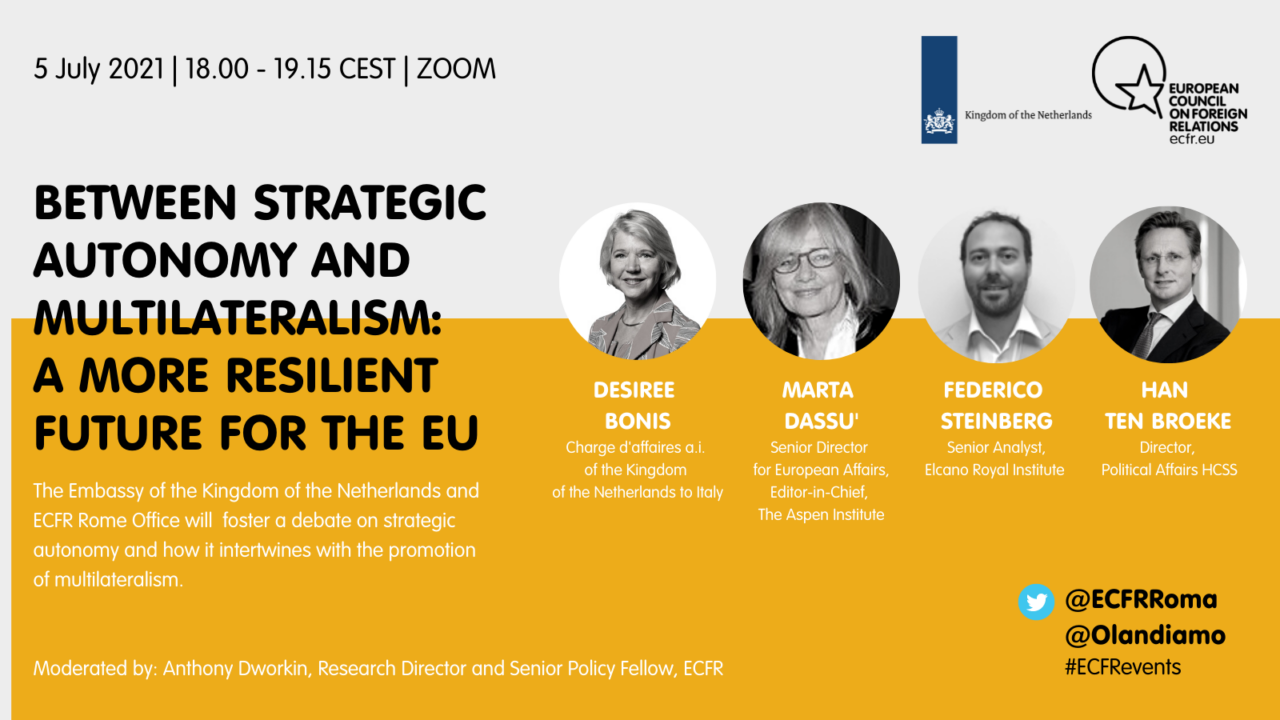Between strategic autonomy and multilateralism: a more resilient future for the EU
The Embassy of the Kingdom of the Netherlands and ECFR Rome Office aim at fostering a debate on strategic autonomy and how it intertwines with the promotion of multilateralism
Guests
Désirée Bonis, Chargé d’Affaires a.i. of the Kingdom of the Netherlands to Italy
Marta Dassù, Senior Director, European Affairs, The Aspen Institute; Editor-in-chief, Aspenia
Federico Steinberg, Senior Analyst, Elcano Royal Institute
Han ten Broeke, Director, Political Affairs, The Hague Centre for Strategic Studies
Chaired by
Anthony Dworkin, Research Director and Senior Policy Fellow, ECFR
The EU Strategic Agenda 2019-2024 sets forth that “the EU needs to pursue a strategic course of action and increase its capacity to act autonomously to safeguard its interests, uphold its values and way of life, and help shape the global future.” Developments in 2020 have spurred a serious debate on strategic autonomy level by revealing the risks of asymmetric dependencies in strategic sectors, spurring a new debate on interdependence, resilience and multilateralism.
In a joint non-paper, Spain and the Netherlands set out that strategic autonomy does not imply isolationism or economic protectionism, but instead must be built on principles of openness, multilateralism and rules-based free trade, without undermining the interests of the least developed countries. The European Council also stressed last October the need to achieve “strategic autonomy while preserving an open economy.” In other words, strategic autonomy must foster greater resilience and interdependence, in which interoperability must prevail over uniformity.
It is, however, not only a European discussion. The broader discussion calls for the promotion of a rules-based international order and the development of common strategies to reform and strengthen key multilateral institutions, such as the WHO and the WTO, and other multilateral fora, such as the G20. The Italian G20 Presidency this year is therefore an important vehicle to champion an active and effective international rules-based system, become more resilient to crises and provide a collective response with a focus on Building Back Better and achieving the Sustainable Development Goals.
In this light, the Embassy of the Kingdom of the Netherlands, in collaboration with the Rome Office of the European Council for Foreign Relations, aim at fostering a debate on the promotion of multilateralism, resilience and a level playing field. Together with experts from various countries, the occasion invites for a more in-depth discussion on how to manage internal and external dependencies in strategic sectors, improve resilience in the supply and value chains, and protect and promote the effective rules-based order in international trade.
For any additional information, please do not hesitate to contact us at [email protected]

